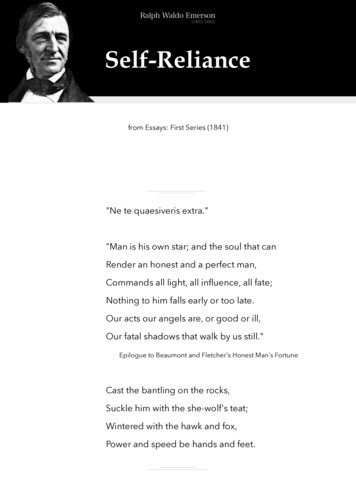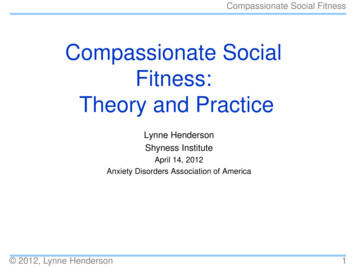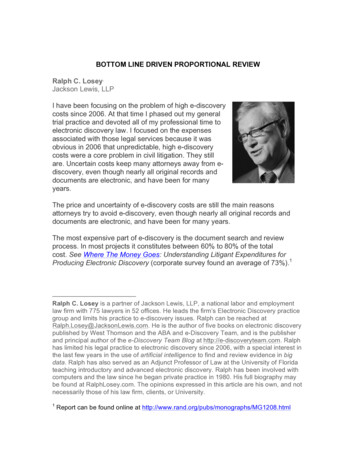
Transcription
Type to enter textSelf-Reliancefrom Essays: First Series (1841)"Ne te quaesiveris extra.""Man is his own star; and the soul that canRender an honest and a perfect man,Commands all light, all influence, all fate;Nothing to him falls early or too late.Our acts our angels are, or good or ill,Our fatal shadows that walk by us still."Epilogue to Beaumont and Fletcher's Honest Man's FortuneCast the bantling on the rocks,Suckle him with the she-wolf's teat;Wintered with the hawk and fox,Power and speed be hands and feet.
Self-Reliance - Ralph Waldo EmersonI read the other day some verses written by an eminent painter which were original and notconventional. The soul always hears an admonition in such lines, let the subject be what itmay. The sentiment they instil is of more value than any thought they may contain. Tobelieve your own thought, to believe that what is true for you in your private heart is true forall men, — that is genius. Speak your latent conviction, and it shall be the universal sense; forthe inmost in due time becomes the outmost,—— and our first thought is rendered back to usby the trumpets of the Last Judgment. Familiar as the voice of the mind is to each, thehighest merit we ascribe to Moses, Plato, and Milton is, that they set at naught books andtraditions, and spoke not what men but what they thought. A man should learn to detectand watch that gleam of light which flashes across his mind from within, more than the lustreof the firmament of bards and sages. Yet he dismisses without notice his thought, because itis his. In every work of genius we recognize our own rejected thoughts: they come back tous with a certain alienated majesty. Great works of art have no more affecting lesson for usthan this. They teach us to abide by our spontaneous impression with good-humoredinflexibility then most when the whole cry of voices is on the other side. Else, to-morrow astranger will say with masterly good sense precisely what we have thought and felt all thetime, and we shall be forced to take with shame our own opinion from another.There is a time in every man's education when he arrives at the conviction that envy isignorance; that imitation is suicide; that he must take himself for better, for worse, as hisportion; that though the wide universe is full of good, no kernel of nourishing corn cancome to him but through his toil bestowed on that plot of ground which is given to him totill. The power which resides in him is new in nature, and none but he knows what that iswhich he can do, nor does he know until he has tried. Not for nothing one face, onecharacter, one fact, makes much impression on him, and another none. This sculpture in thememory is not without preestablished harmony. The eye was placed where one ray shouldfall, that it might testify of that particular ray. We but half express ourselves, and areashamed of that divine idea which each of us represents. It may be safely trusted as 1996-2019 EmersonCentral.comPage 2 of 26
Self-Reliance - Ralph Waldo Emersonproportionate and of good issues, so it be faithfully imparted, but God will not have his workmade manifest by cowards. A man is relieved and gay when he has put his heart into hiswork and done his best; but what he has said or done otherwise, shall give him no peace. Itis a deliverance which does not deliver. In the attempt his genius deserts him; no musebefriends; no invention, no hope.Trust thyself: every heart vibrates to that iron string. Accept the place the divine providencehas found for you, the society of your contemporaries, the connection of events. Great menhave always done so, and confided themselves childlike to the genius of their age, betrayingtheir perception that the absolutely trustworthy was seated at their heart, working throughtheir hands, predominating in all their being. And we are now men, and must accept in thehighest mind the same transcendent destiny; and not minors and invalids in a protectedcorner, not cowards fleeing before a revolution, but guides, redeemers, and benefactors,obeying the Almighty effort, and advancing on Chaos and the Dark.What pretty oracles nature yields us on this text, in the face and behaviour of children,babes, and even brutes! That divided and rebel mind, that distrust of a sentiment becauseour arithmetic has computed the strength and means opposed to our purpose, these havenot. Their mind being whole, their eye is as yet unconquered, and when we look in theirfaces, we are disconcerted. Infancy conforms to nobody: all conform to it, so that one babecommonly makes four or five out of the adults who prattle and play to it. So God has armedyouth and puberty and manhood no less with its own piquancy and charm, and made itenviable and gracious and its claims not to be put by, if it will stand by itself. Do not think theyouth has no force, because he cannot speak to you and me. Hark! in the next room hisvoice is sufficiently clear and emphatic. It seems he knows how to speak to hiscontemporaries. Bashful or bold, then, he will know how to make us seniors veryunnecessary. 1996-2019 EmersonCentral.comPage 3 of 26
Self-Reliance - Ralph Waldo EmersonThe nonchalance of boys who are sure of a dinner, and would disdain as much as a lord todo or say aught to conciliate one, is the healthy attitude of human nature. A boy is in theparlour what the pit is in the playhouse; independent, irresponsible, looking out from hiscorner on such people and facts as pass by, he tries and sentences them on their merits, inthe swift, summary way of boys, as good, bad, interesting, silly, eloquent, troublesome. Hecumbers himself never about consequences, about interests: he gives an independent,genuine verdict. You must court him: he does not court you. But the man is, as it were,clapped into jail by his consciousness. As soon as he has once acted or spoken with eclat, heis a committed person, watched by the sympathy or the hatred of hundreds, whoseaffections must now enter into his account. There is no Lethe for this. Ah, that he could passagain into his neutrality! Who can thus avoid all pledges, and having observed, observeagain from the same unaffected, unbiased, unbribable, unaffrighted innocence, must alwaysbe formidable. He would utter opinions on all passing affairs, which being seen to be notprivate, but necessary, would sink like darts into the ear of men, and put them in fear.These are the voices which we hear in solitude, but they grow faint and inaudible as weenter into the world. Society everywhere is in conspiracy against the manhood of every oneof its members. Society is a joint-stock company, in which the members agree, for the bettersecuring of his bread to each shareholder, to surrender the liberty and culture of the eater.The virtue in most request is conformity. Self-reliance is its aversion. It loves not realities andcreators, but names and customs.Whoso would be a man must be a nonconformist. He who would gather immortal palmsmust not be hindered by the name of goodness, but must explore if it be goodness.Nothing is at last sacred but the integrity of your own mind. Absolve you to yourself, andyou shall have the suffrage of the world. I remember an answer which when quite young Iwas prompted to make to a valued adviser, who was wont to importune me with the dearold doctrines of the church. On my saying, What have I to do with the sacredness of 1996-2019 EmersonCentral.comPage 4 of 26
Self-Reliance - Ralph Waldo Emersontraditions, if I live wholly from within? my friend suggested, — "But these impulses may befrom below, not from above." I replied, "They do not seem to me to be such; but if I am theDevil's child, I will live then from the Devil." No law can be sacred to me but that of mynature. Good and bad are but names very readily transferable to that or this; the only right iswhat is after my constitution, the only wrong what is against it. A man is to carry himself inthe presence of all opposition, as if every thing were titular and ephemeral but he. I amashamed to think how easily we capitulate to badges and names, to large societies anddead institutions. Every decent and well-spoken individual affects and sways me more thanis right. I ought to go upright and vital, and speak the rude truth in all ways. If malice andvanity wear the coat of philanthropy, shall that pass? If an angry bigot assumes this bountifulcause of Abolition, and comes to me with his last news from Barbadoes, why should I notsay to him, 'Go love thy infant; love thy wood-chopper: be good-natured and modest: havethat grace; and never varnish your hard, uncharitable ambition with this incredibletenderness for black folk a thousand miles off. Thy love afar is spite at home.' Rough andgraceless would be such greeting, but truth is handsomer than the affectation of love. Yourgoodness must have some edge to it, — else it is none. The doctrine of hatred must bepreached as the counteraction of the doctrine of love when that pules and whines. I shunfather and mother and wife and brother, when my genius calls me. I would write on thelintels of the door-post, Whim. I hope it is somewhat better than whim at last, but we cannotspend the day in explanation. Expect me not to show cause why I seek or why I excludecompany. Then, again, do not tell me, as a good man did to-day, of my obligation to put allpoor men in good situations. Are they my poor? I tell thee, thou foolish philanthropist, that Igrudge the dollar, the dime, the cent, I give to such men as do not belong to me and towhom I do not belong. There is a class of persons to whom by all spiritual affinity I ambought and sold; for them I will go to prison, if need be; but your miscellaneous popularcharities; the education at college of fools; the building of meeting-houses to the vain endto which many now stand; alms to sots; and the thousandfold Relief Societies; — though I 1996-2019 EmersonCentral.comPage 5 of 26
Self-Reliance - Ralph Waldo Emersonconfess with shame I sometimes succumb and give the dollar, it is a wicked dollar which byand by I shall have the manhood to withhold.Virtues are, in the popular estimate, rather the exception than the rule. There is the man andhis virtues. Men do what is called a good action, as some piece of courage or charity, muchas they would pay a fine in expiation of daily non-appearance on parade. Their works aredone as an apology or extenuation of their living in the world, — as invalids and the insanepay a high board. Their virtues are penances. I do not wish to expiate, but to live. My life isfor itself and not for a spectacle. I much prefer that it should be of a lower strain, so it begenuine and equal, than that it should be glittering and unsteady. I wish it to be sound andsweet, and not to need diet and bleeding. I ask primary evidence that you are a man, andrefuse this appeal from the man to his actions. I know that for myself it makes no differencewhether I do or forbear those actions which are reckoned excellent. I cannot consent to payfor a privilege where I have intrinsic right. Few and mean as my gifts may be, I actually am,and do not need for my own assurance or the assurance of my fellows any secondarytestimony.What I must do is all that concerns me, not what the people think. This rule, equally arduousin actual and in intellectual life, may serve for the whole distinction between greatness andmeanness. It is the harder, because you will always find those who think they know what isyour duty better than you know it. It is easy in the world to live after the world's opinion; it iseasy in solitude to live after our own; but the great man is he who in the midst of the crowdkeeps with perfect sweetness the independence of solitude.The objection to conforming to usages that have become dead to you is, that it scatters yourforce. It loses your time and blurs the impression of your character. If you maintain a deadchurch, contribute to a dead Bible-society, vote with a great party either for the governmentor against it, spread your table like base housekeepers, — under all these screens I have 1996-2019 EmersonCentral.comPage 6 of 26
Self-Reliance - Ralph Waldo Emersondifficulty to detect the precise man you are. And, of course, so much force is withdrawn fromyour proper life. But do your work, and I shall know you. Do your work, and you shallreinforce yourself. A man must consider what a blindman's-buff is this game of conformity. IfI know your sect, I anticipate your argument. I hear a preacher announce for his text andtopic the expediency of one of the institutions of his church. Do I not know beforehand thatnot possibly can he say a new and spontaneous word? Do I not know that, with all thisostentation of examining the grounds of the institution, he will do no such thing? Do I notknow that he is pledged to himself not to look but at one side, — the permitted side, not as aman, but as a parish minister? He is a retained attorney, and these airs of the bench are theemptiest affectation. Well, most men have bound their eyes with one or anotherhandkerchief, and attached themselves to some one of these communities of opinion. Thisconformity makes them not false in a few particulars, authors of a few lies, but false in allparticulars. Their every truth is not quite true. Their two is not the real two, their four not thereal four; so that every word they say chagrins us, and we know not where to begin to setthem right. Meantime nature is not slow to equip us in the prison-uniform of the party towhich we adhere. We come to wear one cut of face and figure, and acquire by degrees thegentlest asinine expression. There is a mortifying experience in particular, which does notfail to wreak itself also in the general history; I mean "the foolish face of praise," the forcedsmile which we put on in company where we do not feel at ease in answer to conversationwhich does not interest us. The muscles, not spontaneously moved, but moved by a lowusurping wilfulness, grow tight about the outline of the face with the most disagreeablesensation.For nonconformity the world whips you with its displeasure. And therefore a man must knowhow to estimate a sour face. The by-standers look askance on him in the public street or inthe friend's parlour. If this aversation had its origin in contempt and resistance like his own,he might well go home with a sad countenance; but the sour faces of the multitude, liketheir sweet faces, have no deep cause, but are put on and off as the wind blows and a 1996-2019 EmersonCentral.comPage 7 of 26
Self-Reliance - Ralph Waldo Emersonnewspaper directs. Yet is the discontent of the multitude more formidable than that of thesenate and the college. It is easy enough for a firm man who knows the world to brook therage of the cultivated classes. Their rage is decorous and prudent, for they are timid asbeing very vulnerable themselves. But when to their feminine rage the indignation of thepeople is added, when the ignorant and the poor are aroused, when the unintelligent bruteforce that lies at the bottom of society is made to growl and mow, it needs the habit ofmagnanimity and religion to treat it godlike as a trifle of no concernment.The other terror that scares us from self-trust is our consistency; a reverence for our past actor word, because the eyes of others have no other data for computing our orbit than ourpast acts, and we are loath to disappoint them.But why should you keep your head over your shoulder? Why drag about this corpse ofyour memory, lest you contradict somewhat you have stated in this or that public place?Suppose you should contradict yourself; what then? It seems to be a rule of wisdom neverto rely on your memory alone, scarcely even in acts of pure memory, but to bring the pastfor judgment into the thousand-eyed present, and live ever in a new day. In yourmetaphysics you have denied personality to the Deity: yet when the devout motions of thesoul come, yield to them heart and life, though they should clothe God with shape andcolor. Leave your theory, as Joseph his coat in the hand of the harlot, and flee.A foolish consistency is the hobgoblin of little minds, adored by little statesmen andphilosophers and divines. With consistency a great soul has simply nothing to do. He may aswell concern himself with his shadow on the wall. Speak what you think now in hard words,and to-morrow speak what to-morrow thinks in hard words again, though it contradict everything you said to-day. — 'Ah, so you shall be sure to be misunderstood.' — Is it so bad, then,to be misunderstood? Pythagoras was misunderstood, and Socrates, and Jesus, and Luther, 1996-2019 EmersonCentral.comPage 8 of 26
Self-Reliance - Ralph Waldo Emersonand Copernicus, and Galileo, and Newton, and every pure and wise spirit that ever tookflesh. To be great is to be misunderstood.I suppose no man can violate his nature. All the sallies of his will are rounded in by the law ofhis being, as the inequalities of Andes and Himmaleh are insignificant in the curve of thesphere. Nor does it matter how you gauge and try him. A character is like an acrostic orAlexandrian stanza; — read it forward, backward, or across, it still spells the same thing. Inthis pleasing, contrite wood-life which God allows me, let me record day by day my honestthought without prospect or retrospect, and, I cannot doubt, it will be found symmetrical,though I mean it not, and see it not. My book should smell of pines and resound with thehum of insects. The swallow over my window should interweave that thread or straw hecarries in his bill into my web also. We pass for what we are. Character teaches above ourwills. Men imagine that they communicate their virtue or vice only by overt actions, and donot see that virtue or vice emit a breath every moment.There will be an agreement in whatever variety of actions, so they be each honest andnatural in their hour. For of one will, the actions will be harmonious, however unlike theyseem. These varieties are lost sight of at a little distance, at a little height of thought. Onetendency unites them all. The voyage of the best ship is a zigzag line of a hundred tacks. Seethe line from a sufficient distance, and it straightens itself to the average tendency. Yourgenuine action will explain itself, and will explain your other genuine actions. Yourconformity explains nothing. Act singly, and what you have already done singly will justifyyou now. Greatness appeals to the future. If I can be firm enough to-day to do right, andscorn eyes, I must have done so much right before as to defend me now. Be it how it will, doright now. Always scorn appearances, and you always may. The force of character iscumulative. All the foregone days of virtue work their health into this. What makes themajesty of the heroes of the senate and the field, which so fills the imagination? Theconsciousness of a train of great days and victories behind. They shed an united light on the 1996-2019 EmersonCentral.comPage 9 of 26
Self-Reliance - Ralph Waldo Emersonadvancing actor. He is attended as by a visible escort of angels. That is it which throwsthunder into Chatham's voice, and dignity into Washington's port, and America intoAdams's eye. Honor is venerable to us because it is no ephemeris. It is always ancient virtue.We worship it to-day because it is not of to-day. We love it and pay it homage, because it isnot a trap for our love and homage, but is self-dependent, self-derived, and therefore of anold immaculate pedigree, even if shown in a young person.I hope in these days we have heard the last of conformity and consistency. Let the words begazetted and ridiculous henceforward. Instead of the gong for dinner, let us hear a whistlefrom the Spartan fife. Let us never bow and apologize more. A great man is coming to eat atmy house. I do not wish to please him; I wish that he should wish to please me. I will standhere for humanity, and though I would make it kind, I would make it true. Let us affront andreprimand the smooth mediocrity and squalid contentment of the times, and hurl in the faceof custom, and trade, and office, the fact which is the upshot of all history, that there is agreat responsible Thinker and Actor working wherever a man works; that a true manbelongs to no other time or place, but is the centre of things. Where he is, there is nature.He measures you, and all men, and all events. Ordinarily, every body in society reminds us ofsomewhat else, or of some other person. Character, reality, reminds you of nothing else; ittakes place of the whole creation. The man must be so much, that he must make allcircumstances indifferent. Every true man is a cause, a country, and an age; requires infinitespaces and numbers and time fully to accomplish his design; — and posterity seem to followhis steps as a train of clients. A man Caesar is born, and for ages after we have a RomanEmpire. Christ is born, and millions of minds so grow and cleave to his genius, that he isconfounded with virtue and the possible of man. An institution is the lengthened shadow ofone man; as, Monachism, of the Hermit Antony; the Reformation, of Luther; Quakerism, ofFox; Methodism, of Wesley; Abolition, of Clarkson. Scipio, Milton called "the height ofRome"; and all history resolves itself very easily into the biography of a few stout andearnest persons. 1996-2019 EmersonCentral.comPage 10 of 26
Self-Reliance - Ralph Waldo EmersonLet a man then know his worth, and keep things under his feet. Let him not peep or steal, orskulk up and down with the air of a charity-boy, a bastard, or an interloper, in the worldwhich exists for him. But the man in the street, finding no worth in himself whichcorresponds to the force which built a tower or sculptured a marble god, feels poor whenhe looks on these. To him a palace, a statue, or a costly book have an alien and forbiddingair, much like a gay equipage, and seem to say like that, 'Who are you, Sir?' Yet they all arehis, suitors for his notice, petitioners to his faculties that they will come out and takepossession. The picture waits for my verdict: it is not to command me, but I am to settle itsclaims to praise. That popular fable of the sot who was picked up dead drunk in the street,carried to the duke's house, washed and dressed and laid in the duke's bed, and, on hiswaking, treated with all obsequious ceremony like the duke, and assured that he had beeninsane, owes its popularity to the fact, that it symbolizes so well the state of man, who is inthe world a sort of sot, but now and then wakes up, exercises his reason, and finds himself atrue prince.Our reading is mendicant and sycophantic. In history, our imagination plays us false.Kingdom and lordship, power and estate, are a gaudier vocabulary than private John andEdward in a small house and common day's work; but the things of life are the same toboth; the sum total of both is the same. Why all this deference to Alfred, and Scanderbeg,and Gustavus? Suppose they were virtuous; did they wear out virtue? As great a stakedepends on your private act to-day, as followed their public and renowned steps. Whenprivate men shall act with original views, the lustre will be transferred from the actions ofkings to those of gentlemen.The world has been instructed by its kings, who have so magnetized the eyes of nations. Ithas been taught by this colossal symbol the mutual reverence that is due from man to man.The joyful loyalty with which men have everywhere suffered the king, the noble, or the great 1996-2019 EmersonCentral.comPage 11 of 26
Self-Reliance - Ralph Waldo Emersonproprietor to walk among them by a law of his own, make his own scale of men and things,and reverse theirs, pay for benefits not with money but with honor, and represent the law inhis person, was the hieroglyphic by which they obscurely signified their consciousness oftheir own right and comeliness, the right of every man.The magnetism which all original action exerts is explained when we inquire the reason ofself-trust. Who is the Trustee? What is the aboriginal Self, on which a universal reliance maybe grounded? What is the nature and power of that science-baffling star, without parallax,without calculable elements, which shoots a ray of beauty even into trivial and impureactions, if the least mark of independence appear? The inquiry leads us to that source, atonce the essence of genius, of virtue, and of life, which we call Spontaneity or Instinct. Wedenote this primary wisdom as Intuition, whilst all later teachings are tuitions. In that deepforce, the last fact behind which analysis cannot go, all things find their common origin. For,the sense of being which in calm hours rises, we know not how, in the soul, is not diversefrom things, from space, from light, from time, from man, but one with them, and proceedsobviously from the same source whence their life and being also proceed. We first share thelife by which things exist, and afterwards see them as appearances in nature, and forget thatwe have shared their cause. Here is the fountain of action and of thought. Here are the lungsof that inspiration which giveth man wisdom, and which cannot be denied without impietyand atheism. We lie in the lap of immense intelligence, which makes us receivers of its truthand organs of its activity. When we discern justice, when we discern truth, we do nothing ofourselves, but allow a passage to its beams. If we ask whence this comes, if we seek to pryinto the soul that causes, all philosophy is at fault. Its presence or its absence is all we canaffirm. Every man discriminates between the voluntary acts of his mind, and his involuntaryperceptions, and knows that to his involuntary perceptions a perfect faith is due. He may errin the expression of them, but he knows that these things are so, like day and night, not tobe disputed. My wilful actions and acquisitions are but roving; — the idlest reverie, thefaintest native emotion, command my curiosity and respect. Thoughtless people contradict 1996-2019 EmersonCentral.comPage 12 of 26
Self-Reliance - Ralph Waldo Emersonas readily the statement of perceptions as of opinions, or rather much more readily; for, theydo not distinguish between perception and notion. They fancy that I choose to see this orthat thing. But perception is not whimsical, but fatal. If I see a trait, my children will see itafter me, and in course of time, all mankind, — although it may chance that no one has seenit before me. For my perception of it is as much a fact as the sun.The relations of the soul to the divine spirit are so pure, that it is profane to seek to interposehelps. It must be that when God speaketh he should communicate, not one thing, but allthings; should fill the world with his voice; should scatter forth light, nature, time, souls, fromthe centre of the present thought; and new date and new create the whole. Whenever amind is simple, and receives a divine wisdom, old things pass away, — means, teachers, texts,temples fall; it lives now, and absorbs past and future into the present hour. All things aremade sacred by relation to it, — one as much as another. All things are dissolved to theircentre by their cause, and, in the universal miracle, petty and particular miracles disappear.If, therefore, a man claims to know and speak of God, and carries you backward to thephraseology of some old mouldered nation in another country, in another world, believehim not. Is the acorn better than the oak which is its fulness and completion? Is the parentbetter than the child into whom he has cast his ripened being? Whence, then, this worshipof the past? The centuries are conspirators against the sanity and authority of the soul. Timeand space are but physiological colors which the eye makes, but the soul is light; where it is,is day; where it was, is night; and history is an impertinence and an injury, if it be any thingmore than a cheerful apologue or parable of my being and becoming.Man is timid and apologetic; he is no longer upright; he dares not say 'I think,' 'I am,' butquotes some saint or sage. He is ashamed before the blade of grass or the blowing rose.These roses under my window make no reference to former roses or to better ones; they arefor what they are; they exist with God to-day. There is no time to them. There is simply therose; it is perfect in every moment of its existence. Before a leaf-bud has burst, its whole life 1996-2019 EmersonCentral.comPage 13 of 26
Self-Reliance - Ralph Waldo Emersonacts; in the full-blown flower there is no more; in the leafless root there is no less. Its nature issatisfied, and it satisfies nature, in all moments alike. But man postpones or remembers; hedoes not live in the present, but with reverted eye laments the past, or, heedless of theriches that surround him, stands on tiptoe to foresee the future. He cannot be happy andstrong until he too lives with nature in the present, above time.This should be plain enough. Yet see what strong intellects dare not yet hear God himself,unless he speak the phraseology of I know not what David, or Jeremiah, or Paul. We shallnot always set so great a price on a few texts, on a few lives. We are like children who repeatby rote the sentences of grandames and tutors, and, as they grow older, of the men oftalents and character they chance to see, — painfully recollecting the exact words theyspoke; afterwards, when they come into the point of view which those had who utteredthese sayings, they understand them, and are willing to let the words go; for, at any time,they can use words as good when occasion comes. If we live truly, we shall see truly. It is aseasy for the strong man to be strong, as it is for the weak to be weak. When we have newperception, we shall gladly disburden the memory of its hoarded treasures as old rubbish.When a man lives with God, his voice shall be as sweet as the mu
Self-Reliance - Ralph Waldo Emerson The nonchalance of boys who are sure of a dinner, and would disdain as










